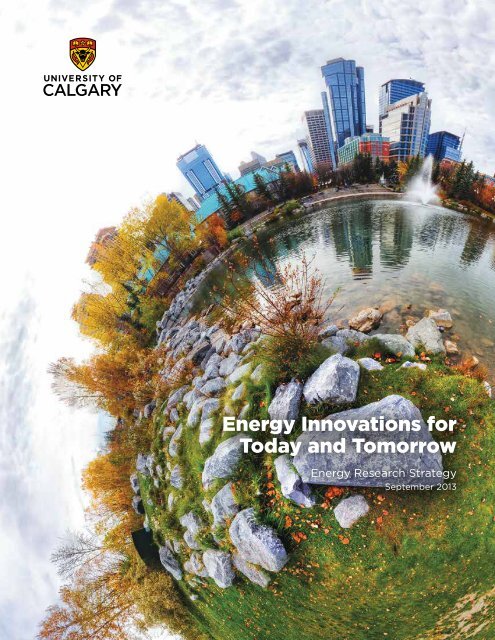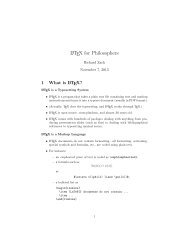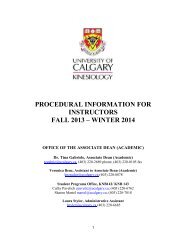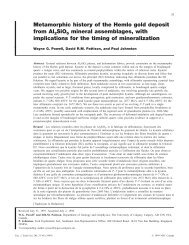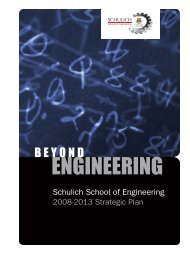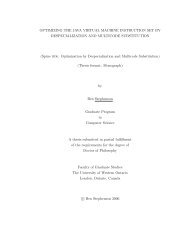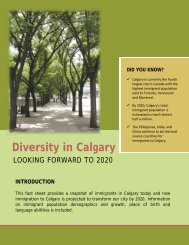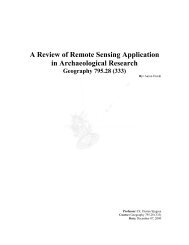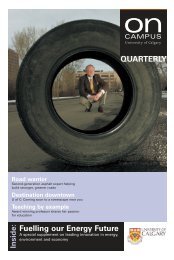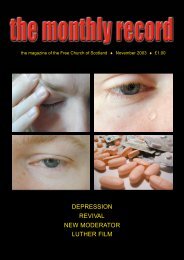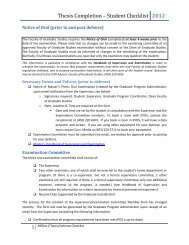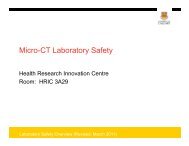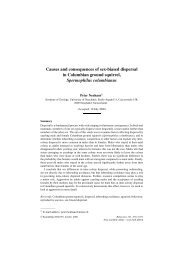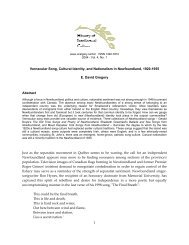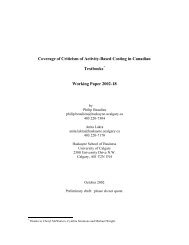Energy Innovations for Today and Tomorrow - University of Calgary
Energy Innovations for Today and Tomorrow - University of Calgary
Energy Innovations for Today and Tomorrow - University of Calgary
You also want an ePaper? Increase the reach of your titles
YUMPU automatically turns print PDFs into web optimized ePapers that Google loves.
<strong>Energy</strong> <strong>Innovations</strong> <strong>for</strong><br />
<strong>Today</strong> <strong>and</strong> <strong>Tomorrow</strong><br />
<strong>Energy</strong> Research Strategy<br />
September 2013<br />
| 1
<strong>Energy</strong> fuels all human activities, including the<br />
production, distribution <strong>and</strong> utilization <strong>of</strong> food,<br />
goods, <strong>and</strong> services. As a global society, we must<br />
find solutions that allow us to:<br />
• Solve the growing disparity between energy<br />
supply <strong>and</strong> dem<strong>and</strong><br />
• Provide safe <strong>and</strong> reliable energy sources to<br />
meet dem<strong>and</strong> while promoting responsible<br />
stewardship <strong>of</strong> resources<br />
• Improve the quality <strong>of</strong> life <strong>and</strong> create prosperity<br />
<strong>for</strong> a growing population while protecting the<br />
environment <strong>and</strong> people from harm<br />
These critical challenges require the development<br />
<strong>of</strong> solutions that meet technical, societal <strong>and</strong><br />
environmental criteria. The <strong>University</strong> <strong>of</strong> <strong>Calgary</strong><br />
will deliver the research to deploy these solutions.<br />
2 | <strong>University</strong> <strong>of</strong> <strong>Calgary</strong> <strong>Energy</strong> Research Strategy
Delivering safe, clean, secure<br />
energy supplies <strong>for</strong> the world<br />
pg.<br />
06<br />
pg.<br />
16<br />
By 2035, with the global population reaching 8.5 billion people <strong>and</strong><br />
assuming no change in patterns <strong>of</strong> energy use, the world will require<br />
energy at a level 1.5 times greater than in 2010. Meeting this dem<strong>and</strong> is a<br />
daunting challenge <strong>and</strong> calls <strong>for</strong> innovative research if future generations<br />
are to enjoy sustained prosperity with minimal environmental impact,<br />
including dramatically reduced carbon emissions.<br />
Through the implementation <strong>of</strong> a new <strong>and</strong><br />
comprehensive <strong>Energy</strong> Research Strategy, the<br />
<strong>University</strong> <strong>of</strong> <strong>Calgary</strong> will take a leadership role in<br />
developing the next generation <strong>of</strong> energy innovations<br />
that the world so urgently needs.<br />
The university has significant capacity to address the<br />
fundamental challenges associated with ensuring safe,<br />
clean <strong>and</strong> secure energy supplies. The university has<br />
made significant investments; we now count more than<br />
two hundred faculty members conducting research<br />
<strong>and</strong> training graduate students <strong>and</strong> postdoctoral<br />
fellows. We have created new research centres,<br />
developed infrastructure to support energy research<br />
<strong>and</strong> attracted some <strong>of</strong> the best minds in the energy<br />
field. We have the largest academic geosciences<br />
program in Canada, world-renowned expertise in<br />
chemical <strong>and</strong> petroleum engineering <strong>and</strong> some <strong>of</strong> the<br />
top scholars in the legal, economic <strong>and</strong> policy aspects<br />
<strong>of</strong> resource development.<br />
The <strong>Energy</strong> Research Strategy will advance the<br />
area <strong>Energy</strong> <strong>Innovations</strong> <strong>for</strong> <strong>Today</strong> <strong>and</strong> <strong>Tomorrow</strong><br />
<strong>of</strong> the university’s Strategic Research Plan, which<br />
identified four research themes directly related to<br />
shaping our energy future. The themes are known<br />
collectively as DEEP:<br />
• Discover new sources<br />
• Extract with minimal environmental impact<br />
• Export to markets<br />
• Plan <strong>for</strong> the future<br />
A set <strong>of</strong> four Gr<strong>and</strong> Challenges cut across these<br />
themes <strong>and</strong> draw on disciplinary <strong>and</strong> interdisciplinary<br />
strengths at the university:<br />
• Unconventional hydrocarbon resources<br />
• Hydraulic fracturing<br />
• Toward low-carbon energy<br />
• Cumulative effects <strong>of</strong> energy-related processes<br />
A ‘confederation <strong>of</strong> scholars’ will leverage<br />
interdisciplinary collaboration to advance research<br />
on both local <strong>and</strong> global scales. The university will<br />
provide $1 million in matching funds to assist these<br />
scholars in developing partnerships <strong>and</strong> competing<br />
<strong>for</strong> external funds. The university will also recruit<br />
over 30 new assistant pr<strong>of</strong>essors, postdoctoral<br />
scholars <strong>and</strong> research chairs to work on priority<br />
energy research topics. A further $1 million from<br />
external sources will be used to fund activities to<br />
build research collaborations <strong>and</strong> share our research<br />
outcomes with our community.<br />
The <strong>University</strong> <strong>of</strong> <strong>Calgary</strong>’s <strong>Energy</strong> Research Strategy<br />
will deliver world-leading research results <strong>and</strong><br />
technological innovation to achieve lasting economic<br />
<strong>and</strong> environmental benefits <strong>for</strong> Canada.<br />
pg.<br />
20<br />
pg.<br />
14<br />
pg.<br />
28<br />
| 3
4 | <strong>University</strong> <strong>of</strong> <strong>Calgary</strong> <strong>Energy</strong> Research Strategy<br />
The <strong>University</strong> <strong>of</strong> <strong>Calgary</strong><br />
is strategically located<br />
at the core <strong>of</strong> Canada’s<br />
multi-billion-dollar<br />
energy industry.
Building a global hub<br />
<strong>for</strong> energy innovation<br />
Canada is a leader in secure <strong>and</strong> sustainable energy supply, use, <strong>and</strong><br />
innovation. The energy sector accounts <strong>for</strong> 6.9% <strong>of</strong> the country’s GDP<br />
<strong>and</strong> 25.4% <strong>of</strong> export trade revenue ($113.7 billion) 1 . It is the world’s sixthlargest<br />
producer <strong>of</strong> oil, the third-largest producer <strong>of</strong> natural gas <strong>and</strong><br />
hydro-generated power, <strong>and</strong> the second-largest producer <strong>of</strong> uranium.<br />
Canada counts more than 75% <strong>of</strong> its power generation as ‘non–emitting’<br />
<strong>and</strong> <strong>of</strong>fers immense renewable <strong>and</strong> clean-energy potential. 2<br />
The province <strong>of</strong> Alberta is Canada’s energy hub,<br />
with the sector employing nearly one in every six<br />
workers. 3 <strong>Energy</strong> revenues from crude oil, natural gas,<br />
coal, hydro, wind <strong>and</strong> biomass accounted <strong>for</strong> 73%<br />
<strong>of</strong> provincial exports in 2011 (or 27.6% <strong>of</strong> provincial<br />
GDP). 4 As a leader in technology <strong>and</strong> research on<br />
oil s<strong>and</strong>s <strong>and</strong> heavy oil, Alberta is at the <strong>for</strong>efront <strong>of</strong><br />
technologies such as gasification, upgrading, carbon<br />
capture <strong>and</strong> storage, enhanced recovery, water use,<br />
tailings management <strong>and</strong> alternative energy. Alberta’s<br />
oil s<strong>and</strong>s position Canada third behind Venezuela<br />
<strong>and</strong> Saudi Arabia in terms <strong>of</strong> global oil reserves. 5 Our<br />
researchers, entrepreneurs, <strong>and</strong> businesses are setting<br />
international st<strong>and</strong>ards <strong>for</strong> reducing environmental<br />
impacts <strong>and</strong> supporting the development <strong>of</strong> greener<br />
communities. 6<br />
The <strong>University</strong> <strong>of</strong> <strong>Calgary</strong> is located at the core<br />
<strong>of</strong> the energy industry <strong>of</strong> Canada, benefiting from<br />
unparalleled access to corporations, decision-makers<br />
<strong>and</strong> technology receptors. This access gives rise to a<br />
unique opportunity <strong>and</strong> responsibility <strong>for</strong> our university<br />
to be the leader in Canada—<strong>and</strong> one <strong>of</strong> the few leaders<br />
in the world—in high-impact energy research. 8<br />
The city <strong>of</strong> <strong>Calgary</strong> boasts one <strong>of</strong> the top-per<strong>for</strong>ming<br />
economies in North America <strong>and</strong> hosts the head<br />
<strong>of</strong>fices <strong>of</strong> nearly every major oil <strong>and</strong> gas company<br />
in the country as well as the sector’s major trade<br />
associations <strong>and</strong> Canada’s national energy regulator—<br />
the National <strong>Energy</strong> Board. This concentration <strong>of</strong><br />
industry makes <strong>Calgary</strong> a global leader in project<br />
design, exploration, production, finance, processing,<br />
transportation, marketing <strong>and</strong> management. The city<br />
is also a globally recognized centre <strong>for</strong> financing,<br />
designing, constructing <strong>and</strong> operating af<strong>for</strong>dable,<br />
sustainable <strong>and</strong> renewable sources <strong>of</strong> energy. 7<br />
1<br />
Canadian <strong>Energy</strong> Overview 2011: <strong>Energy</strong> Briefing Note (National <strong>Energy</strong> Board website)<br />
2<br />
Natural Resources Canada<br />
3<br />
Government <strong>of</strong> Alberta<br />
4<br />
Canadian Centre <strong>for</strong> <strong>Energy</strong> In<strong>for</strong>mation<br />
5<br />
Oil & Gas Journal, Dec 2012<br />
6<br />
Government <strong>of</strong> Alberta<br />
7<br />
<strong>Calgary</strong> Economic Development<br />
8<br />
<strong>University</strong> <strong>of</strong> <strong>Calgary</strong> Strategic Research Plan, 2012<br />
| 5
Matching our strengths<br />
with opportunities<br />
For over three decades, the <strong>University</strong> <strong>of</strong> <strong>Calgary</strong> has been trans<strong>for</strong>ming<br />
heavy-oil <strong>and</strong> oil-s<strong>and</strong>s research by contributing to a ground-breaking<br />
process. The steam-assisted gravity drainage (SAGD) process allowed<br />
industry to unlock 170 billion barrels <strong>of</strong> in situ bitumen reserves from<br />
previously inaccessible Athabasca reservoirs.<br />
The university’s role in helping to develop SAGD<br />
technology led a paradigm shift in the industry,<br />
resulting in a new underst<strong>and</strong>ing <strong>of</strong> heavy oil <strong>and</strong><br />
oil s<strong>and</strong>s physical operations. <strong>Today</strong>, the <strong>University</strong><br />
<strong>of</strong> <strong>Calgary</strong> is embracing the opportunity to lead the<br />
next great energy innovations.<br />
The primary goal <strong>of</strong> our energy research conducted<br />
by our faculty, staff, <strong>and</strong> students is to advance<br />
knowledge creation, applications, <strong>and</strong> translation<br />
to address major energy system challenges. Our<br />
research will help ensure an energy future that<br />
balances supply <strong>and</strong> dem<strong>and</strong>, in a context <strong>of</strong><br />
responsible resource development that addresses<br />
social, human, environmental <strong>and</strong> economic<br />
constraints. The magnitude <strong>of</strong> the challenges is<br />
enormous <strong>and</strong> we will be global research leaders<br />
in key areas where we have the capacity to make<br />
significant advances.<br />
Our research tackles critical questions about global<br />
energy supply <strong>and</strong> dem<strong>and</strong>, <strong>and</strong> addresses issues<br />
that are <strong>of</strong> direct relevance to the local communities<br />
that we serve <strong>and</strong> lead, by examining energy <strong>and</strong><br />
its impact from the points <strong>of</strong> view <strong>of</strong> technology<br />
innovation, influence on <strong>and</strong> by human systems, <strong>and</strong><br />
the environment <strong>and</strong> ecosystems.<br />
This <strong>Energy</strong> Research Strategy aims to deliver worldleading<br />
research results <strong>and</strong> technological innovations<br />
to support the necessary shift to sustainable economic<br />
energy production globally, <strong>and</strong> providing substantial<br />
economic <strong>and</strong> environmental benefits to Canada.<br />
The university has tremendous capacity to address<br />
the fundamental challenges associated with ensuring<br />
safe <strong>and</strong> secure energy supplies while safeguarding<br />
our environments.<br />
We count more than 200 faculty members who<br />
conduct energy research <strong>and</strong> train more than 550<br />
graduate students <strong>and</strong> 40 postdoctoral fellows, as<br />
well as select undergraduate students. We have<br />
invested in <strong>and</strong> raised funds <strong>for</strong> the creation <strong>of</strong> new<br />
research centres, the development <strong>of</strong> infrastructure<br />
<strong>and</strong> space related to energy research, <strong>and</strong> the<br />
attraction <strong>of</strong> the best minds in the energy field.<br />
Our university has a high concentration <strong>of</strong> pr<strong>of</strong>essors<br />
<strong>and</strong> chairs working within energy-relevant disciplines.<br />
We support more than 30 externally funded chairs in<br />
disciplines such as pipeline engineering, petroleum<br />
microbiology, heavy oil, unconventional gas <strong>and</strong> light<br />
oil, alternative energy, natural resource law, <strong>and</strong> public<br />
policy. This commitment has resulted in the successful<br />
generation <strong>of</strong> new research programs.<br />
The university’s significant investment in energyrelated<br />
graduate-student programs has resulted<br />
in increased enrollment over the past five years.<br />
More than 80 students now graduate each year<br />
from heavy oil <strong>and</strong> oil s<strong>and</strong>s research programs—<br />
the largest such cohort worldwide. Our geosciences<br />
program is the largest in Canada <strong>and</strong> our expertise<br />
in chemical <strong>and</strong> petroleum engineering is worldrenowned.<br />
We have some <strong>of</strong> the best legal scholars,<br />
economists, <strong>and</strong> policy analysts in the resource sector.<br />
In addition, we are committed to increasing our<br />
6 | <strong>University</strong> <strong>of</strong> <strong>Calgary</strong> <strong>Energy</strong> Research Strategy
WE<br />
COUNT<br />
MORE<br />
THAN<br />
200<br />
FACULTY<br />
MEMBERS<br />
IN ENERGY RESEARCH<br />
WHO RESEARCH + TRAIN MORE THAN<br />
550<br />
GRADUATE<br />
STUDENTS<br />
+ 40<br />
POSTDOCTORAL<br />
FELLOWS<br />
+ SELECT UNDERGRADUATE STUDENTS<br />
Our primary goal is to<br />
advance knowledge<br />
creation, applications,<br />
<strong>and</strong> translation that will<br />
address major energy<br />
system challenges.<br />
| 7
8 | <strong>University</strong> <strong>of</strong> <strong>Calgary</strong> <strong>Energy</strong> Research Strategy<br />
The <strong>University</strong> <strong>of</strong> <strong>Calgary</strong><br />
supports more than 20<br />
institutes, centres <strong>and</strong><br />
groups in key areas <strong>of</strong><br />
energy technology <strong>and</strong><br />
policy research.
esearch capacity by recruiting new assistant<br />
pr<strong>of</strong>essors <strong>and</strong> postdoctoral scholars in energyrelated<br />
disciplines.<br />
<strong>Energy</strong> research at the <strong>University</strong> <strong>of</strong> <strong>Calgary</strong> is<br />
strengthened through many research centres<br />
<strong>and</strong> institutes, partnership institutes, <strong>and</strong> through<br />
participation in networks <strong>of</strong> centres <strong>of</strong> excellence<br />
<strong>and</strong> other strategic networks. Currently the university<br />
supports more than 20 institutes, centres<br />
<strong>and</strong> groups in key areas <strong>of</strong> energy technology <strong>and</strong><br />
policy research. These structures greatly enhance<br />
the success <strong>of</strong> interdisciplinary approaches to<br />
the solution <strong>of</strong> research problems <strong>and</strong> to the<br />
underst<strong>and</strong>ing <strong>of</strong> complex phenomena. They also<br />
ensure that the quality <strong>and</strong> impact <strong>of</strong> the research<br />
is at the highest possible levels.<br />
The <strong>University</strong> <strong>of</strong> <strong>Calgary</strong> continues to create<br />
<strong>and</strong> transfer technology. In the last five years<br />
alone, researchers have generated several spin-<strong>of</strong>f<br />
companies <strong>and</strong> have been issued more than 50 oil<br />
s<strong>and</strong>s recovery patents. Several <strong>for</strong>mal collaborations<br />
exist with industry, private <strong>and</strong> public organizations<br />
in various areas <strong>of</strong> energy research. Our new strategy<br />
includes vehicles to exp<strong>and</strong> industry <strong>and</strong> academic<br />
partnerships.<br />
Our university takes pride in <strong>and</strong> rewards the quality<br />
<strong>of</strong> individual scholarship, <strong>and</strong> encourages diversity<br />
<strong>of</strong> approach <strong>and</strong> thought. Disciplinary strength <strong>and</strong><br />
depth are essential <strong>for</strong> our success as an institution<br />
on the international stage.<br />
Research as fuel <strong>for</strong><br />
energy transition<br />
<strong>Energy</strong> cannot be created or destroyed, only<br />
trans<strong>for</strong>med to fuel our needs. Production <strong>of</strong><br />
energy, through trans<strong>for</strong>mation <strong>of</strong> resources<br />
(whether renewable or non-renewable), consumes<br />
energy <strong>and</strong> materials, <strong>and</strong> the by-products<br />
<strong>of</strong> these trans<strong>for</strong>mation processes enter the<br />
environment with potentially harmful effects.<br />
Economic factors, such as cost, price <strong>and</strong> markets<br />
are at the <strong>for</strong>efront <strong>of</strong> many policy <strong>and</strong> investment<br />
decisions <strong>and</strong> play a large role in individual fuel<br />
choices <strong>and</strong> access to energy services.<br />
Non-economic factors also influence energy<br />
systems, such as impacts on local populations<br />
<strong>and</strong> societal systems, urbanization, public health,<br />
rights <strong>of</strong> indigenous people, innovation <strong>and</strong> intergenerational<br />
equity.<br />
Past energy transitions (<strong>for</strong> example from biomass<br />
to coal, <strong>and</strong> from coal to petroleum) involved<br />
complex interactions <strong>of</strong> innovation, economic <strong>and</strong><br />
social drivers, <strong>and</strong> impacts on the environment<br />
<strong>and</strong> quality <strong>of</strong> life. The future transition to lowcarbon<br />
<strong>and</strong> renewable energy is likely to present<br />
similar or greater challenges <strong>and</strong> to require<br />
insightful research.<br />
| 9
Partnering on key energy research<br />
Alberta Sulphur Research Ltd.<br />
This not-<strong>for</strong>-pr<strong>of</strong>it research organization is<br />
affiliated with the Department <strong>of</strong> Chemistry<br />
at the <strong>University</strong> <strong>of</strong> <strong>Calgary</strong> <strong>and</strong> conducts<br />
research in the science <strong>and</strong> technology <strong>of</strong><br />
sulphur <strong>and</strong> its compounds, with particular<br />
emphasis on the production, processing<br />
<strong>and</strong> utilization <strong>of</strong> sour natural gas, sour<br />
crude oils, oil s<strong>and</strong>s <strong>and</strong> related products.<br />
ASRL is in its 50th year <strong>of</strong> operation <strong>and</strong><br />
is supported by a cross-section <strong>of</strong> companies<br />
from the energy sector <strong>and</strong> sulphur<br />
production/supply businesses from North<br />
America, Europe, the Middle East <strong>and</strong> Asia.<br />
chem.ucalgary.ca/asr<br />
Pipeline Engineering Centre<br />
The Pipeline Engineering Centre at the Schulich<br />
School <strong>of</strong> Engineering leads the advancement <strong>of</strong><br />
knowledge in pipeline engineering to meet the needs<br />
<strong>of</strong> the domestic <strong>and</strong> global pipeline industry through<br />
a broad multidisciplinary approach. The centre is<br />
active in education <strong>and</strong> research that crosses all<br />
departments in the engineering school, including<br />
civil, chemical, mechanical, geomatics <strong>and</strong> electrical<br />
engineering. It works collaboratively with industry<br />
regionally <strong>and</strong> internationally to provide training<br />
<strong>and</strong> technology transfer that solves problems <strong>and</strong><br />
advances the industry. The centre is a leader in<br />
pipeline integrity, maintenance, <strong>and</strong> management;<br />
new pipeline technologies; <strong>and</strong> project management.<br />
The Pipeline Engineering Centre develops<br />
collaborative research initiatives, coordinates<br />
research, <strong>and</strong> builds research infrastructure, all<br />
with links to industry at both the national <strong>and</strong><br />
international level. Research areas include:<br />
• Creating improved algorithms<br />
<strong>for</strong> data processing<br />
• Multi-phase flow<br />
• Improvements in safety <strong>and</strong><br />
environmental control<br />
• Integrity management<br />
• Hydrogen transmission<br />
• Carbon dioxide transmission<br />
• Efficiency in fluid <strong>and</strong> gas pipeline flow<br />
• New coatings synthesis<br />
schulich.ucalgary.ca/PEC<br />
10 | <strong>University</strong> <strong>of</strong> <strong>Calgary</strong> <strong>Energy</strong> Research Strategy
Canadian <strong>Energy</strong><br />
Research Institute<br />
This independent, not-<strong>for</strong>-pr<strong>of</strong>it<br />
research organization brings together<br />
industry, academia, <strong>and</strong> government<br />
to provide relevant, independent,<br />
objective economic research in<br />
energy <strong>and</strong> related environmental<br />
issues. The <strong>University</strong> <strong>of</strong> <strong>Calgary</strong> is<br />
one <strong>of</strong> the sponsor organizations−<br />
<strong>and</strong> the only university−represented<br />
on the board <strong>of</strong> directors.<br />
ceri.ca<br />
Canadian Institute <strong>of</strong><br />
Resources Law at the<br />
<strong>University</strong> <strong>of</strong> <strong>Calgary</strong><br />
As the leading national centre<br />
<strong>of</strong> expertise on legal <strong>and</strong> policy<br />
issues related to Canada’s<br />
natural resources, the Canadian<br />
Institute <strong>of</strong> Resources Law<br />
pursues a m<strong>and</strong>ate <strong>of</strong> research,<br />
education <strong>and</strong> publication.<br />
The institute initiates projects<br />
<strong>and</strong> responds to requests from<br />
the public <strong>and</strong> private sectors<br />
<strong>and</strong> from non-governmental<br />
organizations. ucalgary.ca/cirl<br />
| 11
Carbon Management<br />
Canada Inc.<br />
This national network is working<br />
to find commercially feasible ways<br />
to address carbon management<br />
challenges in the fossil energy,<br />
renewable fuels, chemical, cement,<br />
mining <strong>and</strong> metallurgical processing<br />
industries. CMC, which is hosted<br />
at the <strong>University</strong> <strong>of</strong> <strong>Calgary</strong>, has<br />
committed $22 million to 44 research<br />
projects across Canada <strong>and</strong> funds<br />
30 researchers at the university.<br />
cmcghg.com<br />
School <strong>of</strong> Public Policy at<br />
the <strong>University</strong> <strong>of</strong> <strong>Calgary</strong><br />
Supported by more than 100 academics <strong>and</strong><br />
researchers, the work <strong>of</strong> the School <strong>of</strong> Public<br />
Policy <strong>and</strong> its students contributes to a more<br />
meaningful <strong>and</strong> in<strong>for</strong>med public debate on<br />
policy issues to improve Canada’s <strong>and</strong> Alberta’s<br />
economic <strong>and</strong> social per<strong>for</strong>mance. Under<br />
its energy <strong>and</strong> environmental policy portfolio,<br />
the school publishes practical, timely research<br />
in the areas <strong>of</strong> resource taxation, royalty analysis,<br />
regulation <strong>and</strong> sustainability. It also hosts<br />
numerous public events <strong>and</strong> roundtable discussions<br />
featuring world-class speakers with<br />
expertise in energy <strong>and</strong> environmental issues.<br />
policyschool.ucalgary.ca<br />
12 | <strong>University</strong> <strong>of</strong> <strong>Calgary</strong> <strong>Energy</strong> Research Strategy
| 13
Creating a confederation<br />
<strong>of</strong> scholars<br />
The complex problems around securing a safe <strong>and</strong> prosperous energy<br />
future require contributions from multiple disciplines to arrive at<br />
powerful, robust, <strong>and</strong> broadly applicable solutions. A major element<br />
<strong>of</strong> our <strong>Energy</strong> Research Strategy is the <strong>for</strong>mation <strong>of</strong> a self-organized<br />
‘confederation <strong>of</strong> scholars’ to generate interdisciplinary collaboration that<br />
can advance energy research on both local <strong>and</strong> global energy challenges.<br />
We will support our scholars to engage in active<br />
discussions, energy roundtables, <strong>and</strong> national <strong>and</strong><br />
international workshops <strong>and</strong> conferences. We will<br />
also fund major initiatives to help secure provincial,<br />
national, <strong>and</strong> international research grants, prizes,<br />
<strong>and</strong> awards.<br />
Scholars will advance their own energy research<br />
agendas <strong>and</strong> build collaborative networks,<br />
taking advantage <strong>of</strong> funding opportunities from<br />
government, industry <strong>and</strong> other sources. The<br />
deliberate bottom-up approach inherent in the<br />
confederation <strong>of</strong> scholars, with strong support<br />
from the university, will promote a dynamic <strong>and</strong><br />
productive research environment by fully engaging<br />
our researchers.<br />
We believe this will provide a competitive advantage<br />
over the traditional faculty-centred research model.<br />
14 | <strong>University</strong> <strong>of</strong> <strong>Calgary</strong> <strong>Energy</strong> Research Strategy
Building on our research plat<strong>for</strong>ms<br />
Our energy research will draw on <strong>and</strong> contribute to<br />
all <strong>of</strong> the seven plat<strong>for</strong>ms identified in our Strategic<br />
Research Plan:<br />
Research stations: We are developing a new<br />
Geoscience Field Research Site (GFRS) that will be<br />
an international stage <strong>for</strong> research on carbon capture,<br />
CO 2 containment <strong>and</strong> monitoring. This plat<strong>for</strong>m will<br />
play a key role in several <strong>of</strong> the Gr<strong>and</strong> Challenges.<br />
Synthesis <strong>and</strong> visualization: Advances in many<br />
disciplines, using both qualitative <strong>and</strong> quantitative<br />
data, are limited by our abilities to synthesize these<br />
data <strong>and</strong> visualize them to aid our underst<strong>and</strong>ing.<br />
This plat<strong>for</strong>m will play a key role in all four themes<br />
as well as several Gr<strong>and</strong> Challenges.<br />
Research enablers: We will evaluate the contributions<br />
<strong>of</strong> research enablers to determine how they<br />
can be mobilized to support our energy research.<br />
Organizations such as the Enbridge Centre <strong>for</strong><br />
Corporate Sustainability (at the Haskayne School <strong>of</strong><br />
Business) will examine strategies that consider the<br />
social, economic, <strong>and</strong> environmental dimensions <strong>of</strong><br />
business decisions <strong>and</strong> actions.<br />
Commercialization: We will actively support the<br />
commercialization <strong>of</strong> new technology applications<br />
emerging from energy research projects.<br />
Knowledge translation: We will translate <strong>and</strong> mobilize<br />
knowledge gleaned from energy research to help<br />
improve resource stewardship <strong>and</strong> public health.<br />
Analytics <strong>and</strong> simulation: We will support various<br />
decision frameworks <strong>and</strong> the development <strong>of</strong><br />
alternative models <strong>for</strong> energy systems analysis that<br />
will be used to underst<strong>and</strong> the impact <strong>of</strong> trade-<strong>of</strong>fs,<br />
economic factors, <strong>and</strong> technological innovations on<br />
the whole energy system.<br />
Policy creation: The output from all <strong>of</strong> our energy<br />
research projects will provide essential evidence<br />
needed to in<strong>for</strong>m public policy development<br />
<strong>and</strong> decision-making, <strong>and</strong> we will highlight new<br />
opportunities that will drive policy research.<br />
| 15
Getting ‘DEEP’ into<br />
energy research<br />
Our <strong>Energy</strong> Research Strategy will advance the<br />
thematic area <strong>Energy</strong> <strong>Innovations</strong> <strong>for</strong> <strong>Today</strong> <strong>and</strong><br />
<strong>Tomorrow</strong> <strong>of</strong> the university’s Strategic Research Plan. 8<br />
We will focus on four research themes that directly<br />
relate to envisioning, underst<strong>and</strong>ing, influencing, <strong>and</strong><br />
shaping our aspirational energy future.<br />
each <strong>of</strong> the four themes, <strong>and</strong> will draw on these<br />
disciplinary <strong>and</strong> interdisciplinary strengths<br />
to create new knowledge that will promote<br />
prosperity while demonstrating responsible<br />
environmental stewardship. Thematic teams from<br />
the confederation <strong>of</strong> scholars will seek solutions.<br />
The themes, known collectively as DEEP, cut<br />
across energy generation <strong>and</strong> use, <strong>and</strong> incorporate<br />
human <strong>and</strong> environmental dimensions. The<br />
university has a critical mass <strong>of</strong> researchers in<br />
8<br />
<strong>University</strong> <strong>of</strong> <strong>Calgary</strong> Strategic Research Plan:<br />
http://www.ucalgary.ca/vpr/files/vpr/StrategicResearchPlan2012.pdf<br />
Discover<br />
new sources<br />
Plan <strong>for</strong><br />
the future<br />
<strong>Energy</strong><br />
<strong>Innovations</strong><br />
Extract<br />
with minimal<br />
environmental<br />
impact<br />
Export to<br />
markets<br />
16 | <strong>University</strong> <strong>of</strong> <strong>Calgary</strong> <strong>Energy</strong> Research Strategy
D<br />
Discover new sources<br />
Whether it is to find new or efficiently<br />
develop existing fossil resources or develop<br />
novel ways to produce green or alternative<br />
energy, the <strong>University</strong> <strong>of</strong> <strong>Calgary</strong> <strong>of</strong>fers<br />
tremendous strengths that build on past<br />
accomplishments. Research teams with<br />
active industrial collaborations seek to<br />
underst<strong>and</strong> the Earth’s conventional<br />
<strong>and</strong> unconventional energy resources<br />
from the Arctic to the deep biosphere,<br />
encompassing disciplines including<br />
petroleum geology <strong>and</strong> engineering,<br />
geophysics, geochemistry, sedimentology,<br />
paleontology, hydrogeology, basin analysis,<br />
materials science, <strong>and</strong> biogeoscience.<br />
In parallel, breakthroughs are being sought through green chemistry <strong>and</strong> engineering<br />
in renewable <strong>and</strong> alternative energy fields such as solar energy conversion, fuel cells,<br />
<strong>and</strong> hydrogen <strong>and</strong> CO 2 capture <strong>and</strong> storage.<br />
E<br />
Extract with minimal environmental impact<br />
Fossil energy extraction operations are <strong>of</strong> crucial importance to Alberta’s economy. But<br />
many current approaches to extraction <strong>and</strong> conversion are not sustainable. Improved <strong>and</strong><br />
game-changing extraction technologies are required to increase efficiency <strong>and</strong> reduce<br />
environmental footprint. Many <strong>University</strong> <strong>of</strong> <strong>Calgary</strong> researchers are tackling industrial <strong>and</strong><br />
environmental challenges in the oil s<strong>and</strong>s, in situ heavy oil, hydraulic fracturing, upgrading,<br />
shale gas, <strong>and</strong> tight oil; they are applying innovations from physics, chemistry, petroleum<br />
microbiology, metagenomics, <strong>and</strong> sensor <strong>and</strong> environmental monitoring technologies.<br />
Novel extraction processes are being advanced, such as in situ upgrading <strong>and</strong> smart steamassisted<br />
gravity drainage (SAGD) hybrids.<br />
A wide range <strong>of</strong> scientific approaches, from<br />
the water cycle to applied geochemistry,<br />
are being applied to the full monitoring <strong>of</strong><br />
the environmental impact <strong>of</strong> the oil s<strong>and</strong>s<br />
<strong>and</strong> other resource extraction activities.<br />
The potential from major advances in<br />
metagenomics <strong>and</strong> petroleum microbiology<br />
is being explored with the aim <strong>of</strong> realizing<br />
a step change in the environmental per<strong>for</strong>mance<br />
<strong>of</strong> energy extraction.<br />
| 17
E<br />
Export to new markets<br />
Canada is a major energy producer<br />
on the world stage <strong>and</strong> exports<br />
<strong>of</strong> energy products contribute<br />
significantly to national prosperity.<br />
Transportation <strong>of</strong> oil <strong>and</strong> gas to<br />
markets must be done safely,<br />
reliably <strong>and</strong> with minimal impact<br />
on the environment <strong>and</strong> local<br />
populations. The <strong>University</strong> <strong>of</strong><br />
<strong>Calgary</strong> houses the Pipeline<br />
Engineering Centre <strong>and</strong> produces<br />
internationally recognized corrosion<br />
research instrumental to advancing<br />
safe transportation technology. The business, policy <strong>and</strong> regulatory aspects <strong>of</strong> energy<br />
exports are complex <strong>and</strong> are evolving. <strong>University</strong> research groups in law, business <strong>and</strong><br />
public policy investigate <strong>and</strong> analyze issues <strong>of</strong> current interest to in<strong>for</strong>m the public <strong>and</strong><br />
leaders in government <strong>and</strong> industry.<br />
P<br />
Plan <strong>for</strong> the future<br />
Our future will be deeply influenced<br />
by the energy choices we<br />
make today. Thoughtful analysis<br />
must consider more than specific<br />
resources or technologies, but the<br />
complete ‘cradle-to-grave’ energy<br />
system with full accounting <strong>of</strong><br />
economic, social <strong>and</strong> environmental<br />
impacts. Engineering, social<br />
science, business <strong>and</strong> legal scholars<br />
at the university investigate the<br />
past <strong>and</strong> the present in order to<br />
better plan the future, using best<br />
practices in energy systems analysis <strong>and</strong> life cycle assessment. Their research outcomes<br />
are sought by decision-makers in government <strong>and</strong> business to in<strong>for</strong>m the strategies <strong>and</strong><br />
policies that will shape tomorrow.<br />
18 | <strong>University</strong> <strong>of</strong> <strong>Calgary</strong> <strong>Energy</strong> Research Strategy
| 19
Addressing four Gr<strong>and</strong> Challenges<br />
We have identified four Gr<strong>and</strong> Challenges, built on a foundation <strong>of</strong> significant existing or emerging research<br />
strength at the <strong>University</strong> <strong>of</strong> <strong>Calgary</strong> that will mobilize the confederation-<strong>of</strong>-scholars model to make major<br />
research advances over the next three to five years:<br />
1<br />
Unconventional Hydrocarbon Resources (UHRs)<br />
UHRs are the future <strong>of</strong> the fossil fuel industry in<br />
North America <strong>and</strong> likely globally. A variety <strong>of</strong><br />
resource types are classified as ‘unconventional’,<br />
including heavy oil <strong>and</strong> oil s<strong>and</strong>s energy resources<br />
(HOOSER); unconventional gas (UG); <strong>and</strong> lighttight<br />
oil (LTO) <strong>and</strong> liquid-rich shale (LRS), which<br />
together are referred to as unconventional light oil<br />
(ULO). These resources are the priority exploitation<br />
targets in North America, with interest increasing<br />
globally−but not without controversy. What<br />
they have in common is that the hydrocarbon<br />
mobility in the reservoir is very low, requiring<br />
advanced, non-conventional petroleum extraction<br />
methods (e.g., hydraulic fracturing <strong>for</strong> UG/ULO,<br />
thermal stimulation <strong>for</strong> heavy oil) to increase fluid<br />
mobility in the reservoir to enable flow to the<br />
extraction point. Even with advanced technologies,<br />
hydrocarbon recovery is typically very low, <strong>and</strong> the<br />
impact <strong>of</strong> extraction <strong>and</strong> processing techniques<br />
on the environment can be great. Sustainability<br />
in unconventional resource development can<br />
only be achieved if environmental impacts are<br />
mitigated. The research programs at the university<br />
are there<strong>for</strong>e designed around improving<br />
underst<strong>and</strong>ing <strong>of</strong> resources, developing methods<br />
<strong>and</strong> technologies to increase recovery, <strong>and</strong><br />
minimize environmental impact.<br />
Of the UHRs, UG has the lowest carbon footprint<br />
<strong>and</strong> provides a promising transitional hydrocarbonbased<br />
fuel that could replace coal as the most<br />
prevalent energy source <strong>for</strong> power generation,<br />
while lowering CO 2 emissions. However, there<br />
are challenges related to exp<strong>and</strong>ing the market<br />
<strong>for</strong> gas, safely transporting it, <strong>and</strong> reducing the<br />
environmental <strong>and</strong> human impact <strong>of</strong> development.<br />
To increase recovery, we need to advance our<br />
underst<strong>and</strong>ing <strong>of</strong> fluid storage <strong>and</strong> transport<br />
processes, <strong>and</strong> improve hydraulic fracturing<br />
techniques. Furthermore, with the decline in<br />
conventional gas reserves in Canada, new sources<br />
<strong>of</strong> UG must be found if it is to be effective as<br />
a transitional fuel, such as gas derived from<br />
microbial gasification <strong>of</strong> kerogen, coal, oil, <strong>and</strong><br />
bitumen. Novel microbial routes <strong>for</strong> gas-to-liquid<br />
technologies are also potential game-changing<br />
solutions.<br />
Key areas <strong>of</strong> investigation:<br />
• Fundamentals <strong>of</strong> fluid flow <strong>and</strong> storage in UG/<br />
ULO reservoirs—analysis <strong>and</strong> development <strong>of</strong><br />
predictive models<br />
• Characterization <strong>of</strong> the subsurface—<br />
petroleum <strong>and</strong> groundwater system,<br />
including evaluation <strong>of</strong> reservoirs, source<br />
rocks <strong>and</strong> migration dynamics<br />
• Characterization <strong>of</strong> the surface—impacts<br />
on ecosystems <strong>and</strong> communities<br />
• Development <strong>of</strong> production analysis <strong>and</strong><br />
reservoir simulation methods <strong>for</strong> UHRs to<br />
improve <strong>for</strong>ecasting<br />
• Improvement <strong>of</strong> existing recovery technologies<br />
• Development <strong>of</strong> next-generation in situ<br />
technologies <strong>for</strong> recovery <strong>of</strong> currently<br />
inaccessible resources<br />
• Development <strong>of</strong> new play <strong>and</strong> prospect<br />
techniques <strong>for</strong> UG/ULO<br />
• New sources <strong>of</strong> UG <strong>and</strong> novel gas-to-liquid<br />
conversion strategies<br />
• Evaluation <strong>of</strong> markets <strong>for</strong> UG including<br />
transportation <strong>and</strong> power generation<br />
• Reduction <strong>of</strong> environmental footprint <strong>and</strong><br />
enhancement <strong>of</strong> safety<br />
• Improve efficiency in production <strong>and</strong><br />
reduce costs, analysis <strong>of</strong> cost over-runs<br />
on major projects<br />
• Regulatory framework, policy development,<br />
<strong>and</strong> engagement<br />
20 | <strong>University</strong> <strong>of</strong> <strong>Calgary</strong> <strong>Energy</strong> Research Strategy
2<br />
Hydraulic fracturing<br />
Hydraulic fracturing has been used <strong>for</strong> more than<br />
50 years to accelerate hydrocarbon production<br />
<strong>and</strong> increase recovery. Now applied with horizontal<br />
wells <strong>and</strong> over large areas, this technology has<br />
enabled commercial production <strong>of</strong> oil <strong>and</strong> gas<br />
from low-permeability rock <strong>for</strong>mations, changing<br />
the energy l<strong>and</strong>scape in North America. Modern<br />
surveillance technology, such as micro-seismic<br />
monitoring, has revealed that hydraulic fractures,<br />
particularly in unconventional reservoirs, have<br />
complex geometries that are difficult to predict.<br />
While hydraulic fracturing is designed to maximize<br />
petroleum production from the target <strong>for</strong>mation,<br />
the possibility does exist that some fractures<br />
may penetrate non-target zones <strong>and</strong>/or generate<br />
seismic events. This has raised concerns about<br />
contamination <strong>of</strong> shallow aquifers, emissions to<br />
the environment, l<strong>and</strong> use, <strong>and</strong> well integrity <strong>and</strong><br />
safety. As long as hydraulic fracturing continues to<br />
be an important enabling technology <strong>for</strong> resource<br />
development around the world, the urgency to<br />
address these concerns will grow. The <strong>University</strong><br />
<strong>of</strong> <strong>Calgary</strong> is uniquely positioned to per<strong>for</strong>m<br />
basic <strong>and</strong> applied research to address important<br />
scientific, environmental, economic <strong>and</strong> societal<br />
issues associated with hydraulic fracturing.<br />
Key areas <strong>of</strong> investigation:<br />
• Hydraulic fracture monitoring <strong>and</strong><br />
characterization<br />
• Hydraulic fracture design <strong>and</strong> optimization<br />
• Assessment <strong>of</strong> the effects <strong>of</strong> hydraulic<br />
fracturing on water, atmosphere <strong>and</strong><br />
terrestrial environment qualities<br />
• Use <strong>of</strong> hydraulic fracturing to simultaneously<br />
enhance oil recovery <strong>and</strong> sequester CO 2 in<br />
the subsurface<br />
• Comparison <strong>of</strong> Canadian play life cycles to<br />
those in the U.S.<br />
• Development <strong>of</strong> new methods to <strong>for</strong>ecast<br />
long-term production <strong>for</strong> hydraulicallyfractured<br />
horizontal wells<br />
• Water usage <strong>and</strong> recycling <strong>of</strong> water in<br />
hydraulic fracturing<br />
• Improved assessment <strong>and</strong> monitoring<br />
<strong>of</strong> wellbore integrity pre- <strong>and</strong> posthydraulic<br />
fracture<br />
• Assessment <strong>of</strong> health risks to society<br />
<strong>and</strong> wildlife<br />
• Legal <strong>and</strong> regulatory framework, disclosure<br />
requirements <strong>for</strong> fluid compositions<br />
• Policy development <strong>and</strong> stakeholder relations:<br />
how to engage people in the decisionmaking<br />
process<br />
• Development <strong>of</strong> new social science models<br />
to quantify the benefits <strong>and</strong> costs <strong>of</strong><br />
hydraulic fracturing<br />
• Business plan to export technology to U.S.<br />
<strong>and</strong> other nations with current or planned<br />
usage <strong>of</strong> hydraulic fracturing<br />
• Communication strategies to explain scientific<br />
results to the public <strong>and</strong> education <strong>of</strong> the<br />
public in underst<strong>and</strong>ing technical risk<br />
To successfully undertake the field-based research<br />
topics outlined above, a national field research<br />
facility will be established, ensuring a national <strong>and</strong><br />
international pr<strong>of</strong>ile <strong>for</strong> this research initiative.<br />
| 21
3<br />
Toward low carbon energy<br />
Trans<strong>for</strong>mative changes are needed in Canadian<br />
<strong>and</strong> global energy systems to quickly <strong>and</strong> deeply<br />
cut greenhouse gas (GHG) emissions <strong>and</strong> thus<br />
to mitigate the risk <strong>for</strong> rapid climate change.<br />
Although fossil fuels will continue to be the<br />
primary source <strong>of</strong> energy <strong>for</strong> some time to come,<br />
there is a critical need <strong>for</strong> research to discover <strong>and</strong><br />
prepare <strong>for</strong> the energy systems <strong>of</strong> the future.<br />
Significant technology innovation is required to<br />
develop <strong>and</strong> deploy lower-carbon energy supplies,<br />
improve efficiency, <strong>and</strong> reduce CO 2 emissions from<br />
fossil-based supply. In addition, new technologies<br />
that promise to reduce environmental impacts<br />
from the energy sector also add complexity in the<br />
<strong>for</strong>m <strong>of</strong> new economic, environmental <strong>and</strong> social<br />
trade-<strong>of</strong>fs.<br />
Researchers must not only develop new<br />
energy technologies that are carbon-neutral at<br />
competitive costs, but they must also aim at<br />
near-zero environmental/ecosystem impacts <strong>and</strong><br />
develop more efficient systems <strong>for</strong> managing <strong>and</strong><br />
integrating technologies <strong>and</strong> processes. Decisions<br />
about energy systems must focus on managing<br />
dem<strong>and</strong> <strong>for</strong> energy services, hurdles associated<br />
with new entrants into entrenched energy markets,<br />
changing needs resulting from an aging energy<br />
infrastructure, <strong>and</strong> heightened concerns about<br />
social, cultural, <strong>and</strong> environmental risks. The<br />
<strong>University</strong> <strong>of</strong> <strong>Calgary</strong> is strategically positioned to<br />
carry out research that will move us toward lowcarbon<br />
energy.<br />
Key areas <strong>of</strong> investigation:<br />
• Solar energy<br />
• Wind energy<br />
• Storage <strong>of</strong> renewable energy<br />
• Bi<strong>of</strong>uels<br />
• Geothermal energy<br />
• Technologies to enable low-carbon<br />
communities including building design<br />
<strong>and</strong> transportation<br />
• Reducing CO 2 emissions from transitional<br />
hydrocarbon-based supply with CCS<br />
technologies<br />
• New CO 2 utilization<br />
• Research on geological storage <strong>of</strong> CO 2 <strong>and</strong><br />
the Geoscience Field Research Site (GFRS)<br />
• Novel carbon-capture <strong>and</strong> storage techniques<br />
• CO 2 pipeline monitoring<br />
• <strong>Energy</strong> efficiency <strong>and</strong> dem<strong>and</strong>-side<br />
management<br />
• System design, analysis <strong>and</strong> control<br />
• Public policy <strong>and</strong> regulatory frameworks<br />
<strong>and</strong> public engagement<br />
22 | <strong>University</strong> <strong>of</strong> <strong>Calgary</strong> <strong>Energy</strong> Research Strategy
4<br />
Cumulative effects <strong>of</strong> energy-related processes<br />
Cumulative effects, defined as changes in or<br />
effects on natural, social, economic, <strong>and</strong> cultural<br />
environments caused by past, present <strong>and</strong><br />
<strong>for</strong>eseeable future actions, are <strong>of</strong>ten used to<br />
describe any outcomes or effects <strong>of</strong> industrial<br />
development that accumulate <strong>and</strong> produce<br />
observable impacts on the environment <strong>and</strong><br />
human health. Assessing, measuring, predicting<br />
<strong>and</strong> monitoring cumulative effects are increasingly<br />
required as components <strong>of</strong> regulatory approvals.<br />
Providing a sound analytical <strong>and</strong> scientific basis <strong>for</strong><br />
such assessments <strong>and</strong> underst<strong>and</strong>ing the equity <strong>and</strong><br />
intergenerational dimensions <strong>of</strong> decisions based on<br />
cumulative effects determinations is critical.<br />
The <strong>University</strong> <strong>of</strong> <strong>Calgary</strong> harbours a network <strong>of</strong><br />
research strengths relevant to the study <strong>of</strong> the<br />
cumulative effects <strong>of</strong> energy-related processes <strong>and</strong><br />
emissions. Fundamental <strong>and</strong> applied research is<br />
required to enhance environmental sustainability<br />
<strong>of</strong> industrial processes, in<strong>for</strong>m policy on energy<br />
production, <strong>and</strong> assure healthy ecosystems <strong>and</strong><br />
populations. Since Alberta has a huge stake in<br />
fossil energy, cumulative effects research will focus<br />
on, but not be limited to, this <strong>for</strong>m <strong>of</strong> energy.<br />
Key areas <strong>of</strong> investigation:<br />
• Risks <strong>of</strong> energy production <strong>and</strong> cumulative<br />
pollutant effects to human <strong>and</strong> ecosystem<br />
health, society <strong>and</strong> economy<br />
• Economic <strong>and</strong> social costs <strong>of</strong> risk in the<br />
energy industry <strong>and</strong> translation into best<br />
business practices<br />
• Effective communication <strong>of</strong> risk to aboriginal<br />
<strong>and</strong> other affected populations, the general<br />
public <strong>and</strong> regulators<br />
• Ways to improve government <strong>and</strong> private<br />
decision-making by providing a better<br />
underst<strong>and</strong>ing <strong>of</strong> risk <strong>and</strong> associated trade<strong>of</strong>fs<br />
<strong>of</strong> technologies<br />
• Use <strong>of</strong> life-cycle analysis in the energy<br />
industry to assess cumulative effects<br />
• Development <strong>of</strong> sensors <strong>for</strong> use in populated<br />
<strong>and</strong> remote areas <strong>for</strong> air, l<strong>and</strong> <strong>and</strong> water<br />
measurements<br />
• Development <strong>of</strong> electrical-based <strong>and</strong><br />
biological-based sensors<br />
• Development <strong>of</strong> data collection s<strong>of</strong>tware <strong>and</strong><br />
integration databases <strong>for</strong> optimal assessment<br />
• Advances in toxicity assessment<br />
• How acquired data translate into corporate<br />
responsibility, legislation <strong>and</strong> engagement <strong>of</strong><br />
affected populations<br />
• Discovery <strong>of</strong> new technologies to mitigate<br />
risk/cumulative effects <strong>of</strong> energy production<br />
• Development <strong>of</strong> novel <strong>and</strong> innovative<br />
contaminant-remediation technologies<br />
• Development <strong>of</strong> novel pollution-prevention<br />
technologies <strong>and</strong> integration with monitoring<br />
• How new remediation <strong>and</strong> pollution prevention<br />
technologies translate into legislation,<br />
regulation <strong>and</strong> social license to operate<br />
| 23
Introduced in 2011, the <strong>University</strong> <strong>of</strong> <strong>Calgary</strong>’s Eyes High strategic direction<br />
sets a clear direction to become one <strong>of</strong> Canada’s top five research-intensive<br />
universities by 2016, grounded in innovative thinking <strong>and</strong> teaching, <strong>and</strong> fully<br />
integrated with the community <strong>of</strong> <strong>Calgary</strong>.<br />
24 | <strong>University</strong> <strong>of</strong> <strong>Calgary</strong> <strong>Energy</strong> Research Strategy
As one <strong>of</strong> the roadmaps that deliver on this direction, the Strategic Research Plan (introduced in 2012) is<br />
about inspiring <strong>and</strong> supporting discovery, creativity, <strong>and</strong> innovation across all disciplines. The plan focuses<br />
on three major priorities: matching our strengths with opportunities, increasing our research capacity, <strong>and</strong><br />
creating a dynamic research environment to promote research excellence.<br />
<strong>Energy</strong> <strong>Innovations</strong> <strong>for</strong> <strong>Today</strong> <strong>and</strong> <strong>Tomorrow</strong> is one <strong>of</strong> six multidisciplinary<br />
research themes that are guiding us towards our Eyes High goals. This <strong>Energy</strong><br />
Research Strategy (developed in 2013 under the leadership <strong>of</strong> Ed McCauley,<br />
Vice-president, Research) details how we plan to deliver on that theme.<br />
Ed McCauley, Vice-president, Research at the <strong>University</strong> <strong>of</strong> <strong>Calgary</strong>, is one <strong>of</strong> the world’s<br />
<strong>for</strong>emost researchers in the field <strong>of</strong> population ecology.<br />
EYES HIGH strategic direction<br />
introduced 2011<br />
STRATEGIC RESEARCH PLAN<br />
introduced 2012<br />
ENERGY RESEARCH STRATEGY<br />
introduced 2013<br />
Discover new sources<br />
Extract with minimal<br />
environmental impact<br />
Export to new markets<br />
Plan <strong>for</strong> the future<br />
Resources (UHRs)<br />
Unconventional Hydrocarbon<br />
Hydraulic fracturing<br />
Toward low-carbon energy<br />
Cumulative effects <strong>of</strong><br />
energy-related processes<br />
DEEP<br />
THEMES<br />
GRAND<br />
CHALLENGES<br />
| 25
26 | <strong>University</strong> <strong>of</strong> <strong>Calgary</strong> <strong>Energy</strong> Research Strategy
Promoting commercialization<br />
<strong>and</strong> knowledge transfer<br />
Engagement with all <strong>of</strong> our community stakeholders<br />
<strong>and</strong> partners is essential to ensure that recipients<br />
<strong>of</strong> our research output provide their perspectives<br />
on the Gr<strong>and</strong> Challenges we are addressing. This<br />
engagement will also identify synergies in research<br />
<strong>and</strong> development activities across all partners.<br />
Within our confederation <strong>of</strong> scholars, energy<br />
research teams will bring together faculty members<br />
with a range <strong>of</strong> disciplinary backgrounds to focus<br />
on questions that address the Gr<strong>and</strong> Challenges.<br />
Knowledge transfer <strong>and</strong> commercialization will be<br />
key components in practically implementing the<br />
results <strong>of</strong> our research projects.<br />
The <strong>University</strong> <strong>of</strong> <strong>Calgary</strong> will strongly support<br />
the energy research teams in building industry<br />
alliances <strong>and</strong> close partnerships with private <strong>and</strong><br />
public organizations to assist in solving issues<br />
related to the Gr<strong>and</strong> Challenges. The university will<br />
also engage with partner universities <strong>and</strong> research<br />
organizations—nationally <strong>and</strong> internationally—to<br />
access the most advanced knowledge <strong>and</strong> expertise<br />
on global issues.<br />
Bringing research to market<br />
<strong>University</strong> <strong>of</strong> <strong>Calgary</strong> researchers create <strong>and</strong> transfer<br />
technology, generating spin-<strong>of</strong>f companies that<br />
deliver benefits to society as a whole. For example:<br />
Gushor Inc., a Schlumberger company<br />
Gushor was spun out <strong>of</strong> research conducted by<br />
the Canada Research Chair in Petroleum Geology<br />
<strong>and</strong> a team in the Department <strong>of</strong> Geoscience. It is<br />
a fluid analysis <strong>and</strong> reservoir engineering company<br />
that provides innovative geochemical <strong>and</strong> reservoir<br />
engineering solutions to practical production <strong>and</strong><br />
exploration problems in the heavy oil <strong>and</strong> oils<strong>and</strong>s<br />
industry by integration <strong>of</strong> geology, fluid properties,<br />
geochemistry <strong>and</strong> reservoir simulation. gushor.com<br />
natural gas. Pr<strong>of</strong>ero’s technology has the potential<br />
to significantly increase the recovery <strong>of</strong> heavy oil<br />
from reservoirs already fully exploited by conventional<br />
recovery methods. pr<strong>of</strong>eroenergy.com<br />
nFluids Inc.<br />
nFluids is leveraging the work <strong>of</strong> two university<br />
researchers who developed a proprietary nanoparticle<br />
oil <strong>and</strong> gas drilling fluid additive that reduces fluid<br />
losses during drilling, increases lubrication, <strong>and</strong><br />
strengthens the well bore. These benefits allow<br />
operators to reduce the total energy requirements <strong>and</strong><br />
cost <strong>of</strong> their drilling process, while also reducing the<br />
associated environmental impact. nfluids.com<br />
Pr<strong>of</strong>ero <strong>Energy</strong> Inc.<br />
This oil-<strong>and</strong>-gas technology company’s proprietary<br />
technology is based on biodegradation research by<br />
researchers at the <strong>University</strong> <strong>of</strong> Newcastle <strong>and</strong> the<br />
<strong>University</strong> <strong>of</strong> <strong>Calgary</strong>. Pr<strong>of</strong>ero’s technologies are<br />
designed to recover additional energy assets from<br />
existing heavy-oil wells that are no longer economically<br />
viable. The company is focused on recovering<br />
str<strong>and</strong>ed heavy oil by microbially converting it to<br />
FireWater Fuel Corp.<br />
Firewater is advancing the hydrogen economy<br />
through a game-changing breakthrough in catalyst<br />
technology developed by two chemistry researchers.<br />
The company uses alternative energy sources<br />
such as solar <strong>and</strong> wind power to produce clean<br />
hydrogen fuels that can be used on-dem<strong>and</strong> by<br />
consumers. fwfuel.com
Matching funds to advance<br />
energy research<br />
As our scholars work together on the DEEP research<br />
themes <strong>and</strong> the Gr<strong>and</strong> Challenges, they will seek<br />
major funding opportunities from provincial, national,<br />
<strong>and</strong> international sources. Competing successfully<br />
<strong>for</strong> these large grants requires support <strong>for</strong> grant<br />
development <strong>and</strong> liaison with industry partners <strong>and</strong><br />
other post-secondary institutions. In 2013-2014, the<br />
university will provide $1 million in matching funds to<br />
assist the confederation <strong>of</strong> scholars to compete <strong>for</strong><br />
major external funds.<br />
Support <strong>and</strong> expertise in identifying funding opportunities,<br />
defining research questions, developing<br />
partnerships <strong>and</strong> alliances, <strong>and</strong> preparing grant<br />
proposals will be provided through the Vice-President<br />
(Research) Office to ensure high rates <strong>of</strong> success<br />
in implementing these major initiatives. There will<br />
be an emphasis on developing new collaborative<br />
research opportunities with public- <strong>and</strong> privatesector<br />
partners. The overall objective is to increase<br />
the impact <strong>of</strong> research at the <strong>University</strong> <strong>of</strong> <strong>Calgary</strong><br />
through the creation <strong>of</strong> strategic partnerships that<br />
foster innovation <strong>and</strong> facilitate knowledge transfer<br />
<strong>and</strong> commercialization.<br />
28 | <strong>University</strong> <strong>of</strong> <strong>Calgary</strong> <strong>Energy</strong> Research Strategy
Increasing our expertise<br />
<strong>and</strong> capacity<br />
Based on the expertise <strong>of</strong> our faculty members, we<br />
have substantial research capacity already in place<br />
to tackle the four Gr<strong>and</strong> Challenges:<br />
Unconventional hydrocarbon resources:<br />
152 faculty members / 24 research chairs<br />
Hydraulic fracturing:<br />
130 faculty members / 18 research chairs<br />
Toward low-carbon energy:<br />
122 faculty members / 17 research chairs<br />
Cumulative effects <strong>of</strong> energy-related processes:<br />
128 faculty members / 16 research chairs<br />
Over 2013-14, we will increase our energy research<br />
capacity in three ways:<br />
• Recruit 10 new assistant pr<strong>of</strong>essors in<br />
energy research, three in the area <strong>of</strong> pipeline<br />
engineering <strong>and</strong> seven in natural resource law,<br />
energy economics <strong>and</strong> policy.<br />
• Recruit more than 20 postdoctoral scholars<br />
from around the world to join faculty members<br />
to work on <strong>and</strong> explore priority energy<br />
research topics.<br />
• Increase the number <strong>of</strong> research chairs in<br />
energy via provincial <strong>and</strong> national programs.<br />
Through the Campus Alberta Innovates Program<br />
(CAIP), we are recruiting two world experts in the<br />
area <strong>of</strong> metagenomics applied to energy research.<br />
The CAIP Chair <strong>and</strong> Pr<strong>of</strong>essorship in the Faculty<br />
<strong>of</strong> Science will bolster our strength in petroleum<br />
microbiology <strong>and</strong> reservoir engineering. We are<br />
also recruiting two new Canada Research Chairs<br />
in <strong>Energy</strong> Research in the Schulich School <strong>of</strong><br />
Engineering <strong>and</strong> the Faculty <strong>of</strong> Arts.<br />
Finally, we are recruiting a Canada Excellence<br />
Research Chair (CERC) in new-materials engineering<br />
<strong>for</strong> unconventional oil research. As one <strong>of</strong> the most<br />
prestigious research awards in Canada, the CERC<br />
will be the nucleus <strong>of</strong> a dynamic research team,<br />
supported by new investments <strong>of</strong> over $25 million<br />
that will integrate materials science, petroleum<br />
reservoir engineering, chemical engineering, <strong>and</strong><br />
bioengineering to find trans<strong>for</strong>mative research<br />
breakthroughs <strong>and</strong> commercial opportunities not<br />
possible within any one discipline alone. The CERC<br />
will also engage the heavy oil industrial sector to<br />
explore <strong>and</strong> field-test new recovery solutions that<br />
minimize water use <strong>and</strong> environmental impacts.<br />
| 29
Fully engaging our communities,<br />
building the confederation <strong>of</strong> scholars<br />
The university has secured funding in excess <strong>of</strong><br />
$1 million <strong>for</strong> supporting activities that will foster<br />
networking <strong>and</strong> collaboration at the regional level,<br />
national <strong>and</strong> international levels, with the goal<br />
<strong>of</strong> establishing research <strong>and</strong> commercialization<br />
collaborations that will connect the university with<br />
industry, government <strong>and</strong> other external partners.<br />
These activities are framed within the <strong>University</strong> <strong>of</strong><br />
<strong>Calgary</strong>’s emerging new energy research strategy<br />
<strong>and</strong> the broader Eyes High strategy:<br />
Research workshops: one-day research workshops<br />
during which participants will draft roadmaps <strong>for</strong><br />
research <strong>and</strong> commercialization activities associated<br />
with each <strong>of</strong> the Gr<strong>and</strong> Challenges. Each workshop<br />
will include researchers from the <strong>University</strong> <strong>of</strong><br />
<strong>Calgary</strong>, invited researchers from across Canada,<br />
prominent researchers in each <strong>of</strong> the challenge<br />
areas, <strong>and</strong> experts from industry, government, <strong>and</strong><br />
community partners.<br />
International research conference: this twoday<br />
conference in <strong>Calgary</strong> will be framed on the<br />
Gr<strong>and</strong> Challenges <strong>and</strong> will serve as a ‘test bed’<br />
<strong>for</strong> the research roadmaps produced at each <strong>of</strong><br />
the preceding research workshops. Discussion<br />
panels will be comprised <strong>of</strong> local, national <strong>and</strong><br />
international researchers <strong>and</strong> external experts<br />
drawn from industry, government <strong>and</strong> other<br />
partners in the community.<br />
Research breakfasts: this ‘<strong>Energy</strong> Leaders’ breakfast<br />
series will take place on campus, encouraging<br />
collaboration <strong>and</strong> sharing amongst scholars who<br />
work across the disciplinary lines <strong>of</strong> energy <strong>and</strong><br />
environment research. The focus will be on advances<br />
in research, especially in areas with demonstrated or<br />
potential commercialization activity.<br />
Urban <strong>Energy</strong> <strong>and</strong> Environment Issues seminar<br />
series: this lunch-hour seminar series will take<br />
place at the university’s downtown campus <strong>and</strong> will<br />
cover energy <strong>and</strong> environment issues <strong>of</strong> interest to<br />
people living in a large urban setting. The seminars,<br />
which support the Urban Alliance initiative (see<br />
below), will identify key considerations <strong>for</strong> each<br />
issue <strong>and</strong> stimulate dialogue among investigators<br />
<strong>and</strong> practitioners responsible <strong>for</strong> finding <strong>and</strong><br />
implementing solutions.<br />
Urban Alliance<br />
The Urban Alliance is a research partnership<br />
between the City <strong>of</strong> <strong>Calgary</strong> <strong>and</strong> the <strong>University</strong><br />
<strong>of</strong> <strong>Calgary</strong>. It was created to coordinate a seamless<br />
transfer <strong>of</strong> leading research between the city <strong>and</strong><br />
the university <strong>for</strong> the benefit <strong>of</strong> all our communities.<br />
Its focus is to deliver sustainable quality <strong>of</strong> life to<br />
<strong>Calgary</strong> <strong>and</strong> Alberta <strong>and</strong> is making real impacts<br />
on quality <strong>of</strong> life in <strong>Calgary</strong>, particularly in areas<br />
related to our <strong>Energy</strong> Research Strategy, including:<br />
• Transportation systems optimization<br />
• Urban energy footprint<br />
• Urban <strong>for</strong>m, density <strong>and</strong> social connectivity<br />
• Alternate energy<br />
• Greenhouse gas reduction in l<strong>and</strong>fills<br />
• Urban infrastructure investment planning<br />
<strong>for</strong> climate change<br />
30 | <strong>University</strong> <strong>of</strong> <strong>Calgary</strong> <strong>Energy</strong> Research Strategy
Distinguished speakers series: the university will<br />
host internationally recognized experts in globally<br />
important areas <strong>of</strong> energy <strong>and</strong> environment. This<br />
activity is an important way <strong>for</strong> the <strong>University</strong> <strong>of</strong><br />
<strong>Calgary</strong> to give back <strong>and</strong> engage the public on<br />
globally important issues: each visit will include<br />
meetings, in<strong>for</strong>mal gatherings, public lectures, meals<br />
<strong>and</strong> receptions to facilitate interaction with members<br />
<strong>of</strong> the energy <strong>and</strong> environment community in <strong>Calgary</strong>.<br />
<strong>Energy</strong> <strong>and</strong> Environmental Systems seminar series:<br />
this series <strong>of</strong> technical research talks on campus<br />
will take place throughout the 2013-14 academic<br />
year. Intended <strong>for</strong> specialized researchers in the<br />
energy <strong>and</strong> environment fields, with a primary focus<br />
on students <strong>and</strong> postdoctoral trainees, the series<br />
will provide them with pr<strong>of</strong>essional development<br />
<strong>and</strong> engage them in research, while promoting<br />
collaboration <strong>and</strong> potential commercialization<br />
opportunities.<br />
Communications tools: in addition to a suite <strong>of</strong><br />
promotional materials, a new web space will showcase<br />
the progress <strong>of</strong> our energy research <strong>and</strong> related<br />
activities <strong>and</strong> provide a means <strong>of</strong> communication<br />
between researchers within the confederation <strong>of</strong><br />
scholars <strong>and</strong> the external community.<br />
Expert advice <strong>and</strong> assistance with commercialization:<br />
Innovate <strong>Calgary</strong> is a full-service organization <strong>of</strong>fering<br />
technology transfer <strong>and</strong> business incubator services<br />
to researchers, entrepreneurs <strong>and</strong> businesses within<br />
the advanced technology sector. It is dedicated to<br />
accelerating the commercialization <strong>of</strong> emerging<br />
technologies, facilitating <strong>and</strong> supporting the creation<br />
<strong>of</strong> technology-based companies, <strong>and</strong> assisting in<br />
the growth <strong>of</strong> existing technology companies in<br />
southern Alberta. The university will contract Innovate<br />
<strong>Calgary</strong> to conduct a comprehensive evaluation <strong>of</strong><br />
energy <strong>and</strong> environment research projects that have<br />
been completed or are in progress at the university,<br />
identifying opportunities <strong>for</strong> commercialization <strong>and</strong><br />
providing guidance on how to protect intellectual<br />
property, license the technology, <strong>and</strong>/or create a<br />
related company.<br />
Innovate <strong>Calgary</strong><br />
Innovate <strong>Calgary</strong> is a full-service organization<br />
that fosters the advancement <strong>of</strong> technology business<br />
<strong>for</strong> researchers, entrepreneurs, technology<br />
companies <strong>and</strong> investors within the advanced<br />
technology sector.<br />
Innovate <strong>Calgary</strong> is the technology-transfer <strong>and</strong><br />
business-incubation centre <strong>for</strong> the <strong>University</strong> <strong>of</strong><br />
<strong>Calgary</strong> <strong>and</strong> works closely with the research services<br />
<strong>of</strong>fice <strong>and</strong> the <strong>of</strong>fice <strong>of</strong> the vice-president, research.<br />
It provides expert advice <strong>and</strong> assistance with:<br />
• Intellectual property management/licensing<br />
• Company creation <strong>and</strong> incubation<br />
• Analysis <strong>of</strong> commercial potential<br />
<strong>for</strong> technologies<br />
• Mitigation <strong>of</strong> financial <strong>and</strong> resource risks<br />
relative to commercialization<br />
• Leasing/tenancy opportunities (Alastair<br />
Ross Technology Centre <strong>and</strong> the Research<br />
Transition Facility)<br />
• Entrepreneur development services<br />
<strong>and</strong> programs<br />
innovatecalgary.com<br />
| 31
The <strong>University</strong> <strong>of</strong> <strong>Calgary</strong> is a leading Canadian university located in the nation’s most<br />
enterprising city. The university has a clear strategic direction to become one <strong>of</strong> Canada’s top<br />
five research universities by 2016, where research <strong>and</strong> innovative teaching go h<strong>and</strong> in h<strong>and</strong>,<br />
<strong>and</strong> where we fully engage the communities we both serve <strong>and</strong> lead. This strategy is called<br />
Eyes High, inspired by the university’s Gaelic motto, which translates as ‘I will lift up my eyes.’<br />
As part <strong>of</strong> the roadmap to achieve these goals, the university’s Strategic Research Plan identifies six research<br />
themes that will leverage our distinct capabilities while addressing the unmet needs <strong>and</strong> challenges <strong>of</strong> our<br />
society as a whole:<br />
• Brain <strong>and</strong> mental health<br />
• Human dynamics in a changing world: smart <strong>and</strong> secure cities, societies, <strong>and</strong> cultures<br />
• New earth-space technologies<br />
• Engineering solutions <strong>for</strong> health: biomedical engineering<br />
• Infections, inflammation <strong>and</strong> chronic diseases in the changing environment<br />
• <strong>Energy</strong> innovations <strong>for</strong> today <strong>and</strong> tomorrow<br />
Learn more about the <strong>University</strong> <strong>of</strong> <strong>Calgary</strong>’s<br />
Strategic Research Plan <strong>and</strong> <strong>Energy</strong> Research Strategy.<br />
Contact the Office <strong>of</strong> the Vice-President (Research)<br />
at vpr@ucalgary.ca


